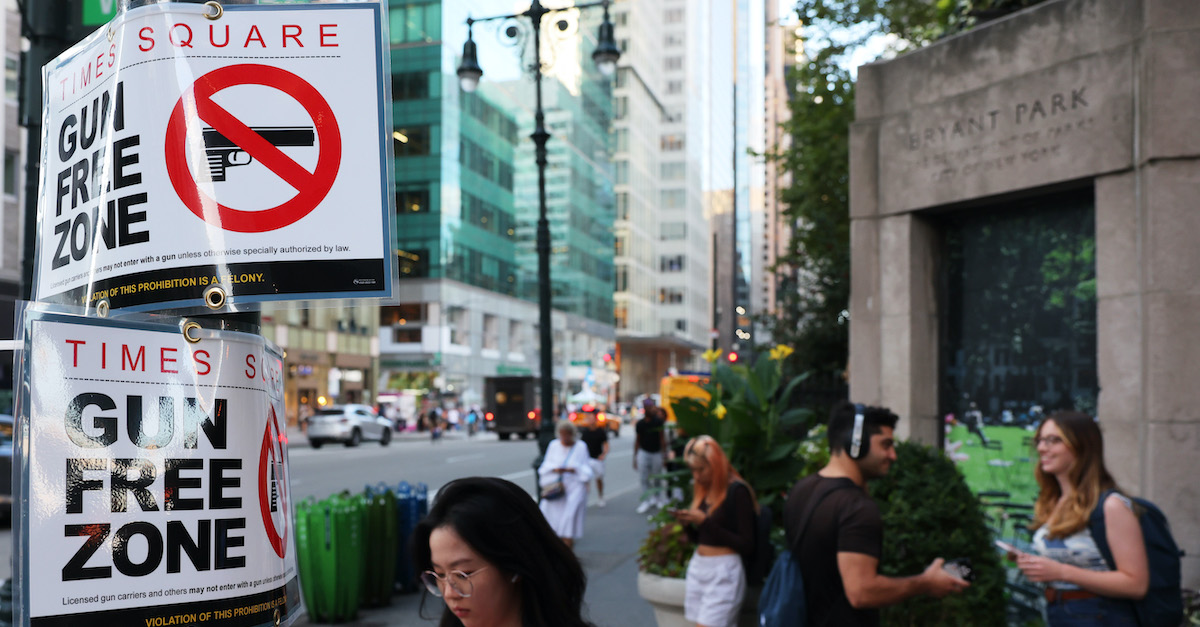
A “Gun Free Zone” sign posted on 41st Street and 6th Avenue on Aug. 31, 2022 in New York City. (Photo by Michael M. Santiago/Getty Images)
The U.S. Supreme Court left New York’s concealed carry law in place until another court hears a challenge to the statute, which enforces restrictions and bans on guns in Times Square, subways and other “sensitive locations.”
The Empire State’s Attorney General Letitia James (D) applauded the ruling.
“We have a right to enact commonsense measures to protect our communities, and I am pleased with the Supreme Court’s decision to allow New York’s concealed carry gun law to remain in effect,” James wrote in a statement. “Too many New Yorkers are plagued by gun violence, and we know that basic gun laws help save lives every day.”
In July, New York passed the Concealed Carry Improvement Act (CCIA) after the Supreme Court stuck down the state’s licensing regime in New York State Rifle & Pistol Association v. Bruen. That ruling, written by Justice Clarence Thomas, established a rule for Second Amendment scrutiny that gun laws must be “consistent with this Nation’s historical tradition of firearm regulation.”
Though passed with that precedent in mind, the CCIA aimed to keep guns out of “sensitive locations,” including public transit, museums, summer camps, playgrounds and health care centers. Second Amendment groups immediately challenged the law. In one federal lawsuit, Schenectady County resident Ivan Antonyuk achieved an early win before a trial judge who declared it unconstitutional.
In October, U.S. District Judge Glenn T. Suddaby, a George W. Bush appointee, applied Thomas’s test and found the New York law inconsistent with centuries-old history.
“Simply stated, instead of moving toward becoming a shall-issue jurisdiction, New York State has further entrenched itself as a shall-not-issue jurisdiction,” Suddaby wrote in a ruling late last year. “And, by doing so, it has further reduced a first-class constitutional right to bear arms in public for self-defense (which, during the 19th and 18th centuries in America, generally came with an assumption that law-abiding responsible citizens were not a danger to themselves or others unless there was specific ground for a contrary finding) into a mere request (which is burdened with a presumption of dangerousness and the need to show ‘good moral character’).”
Another federal court followed suit in a separate case before the Second Circuit unanimously paused both rulings pending appeal.
In a dissent, Justice Samuel Alito said he would have reversed the intermediate appeals court, allowing the trial judges to keep the CCIA blocked.
“The New York law at issue in this application presents novel and serious questions under both the First and the Second Amendments,” Alito wrote, in a dissent joined by Thomas. “The District Court found, in a thorough opinion, that the applicants were likely to succeed on a number of their claims, and it issued a preliminary injunction as to twelve provisions of the challenged law. With one exception, the Second Circuit issued a stay of the injunction in full, and in doing so did not provide any explanation for its ruling.”
From the lack of other noted dissents, it is unclear where the other justices stand on the merits of the CCIA.
“I understand the Court’s denial today to reflect respect for the Second Circuit’s procedures in managing its own docket, rather than expressing any view on the merits of the case,” Alito wrote. “Applicants should not be deterred by today’s order from again seeking relief if the Second Circuit does not, within a reasonable time, provide an explanation for its stay order or expedite consideration of the appeal.”